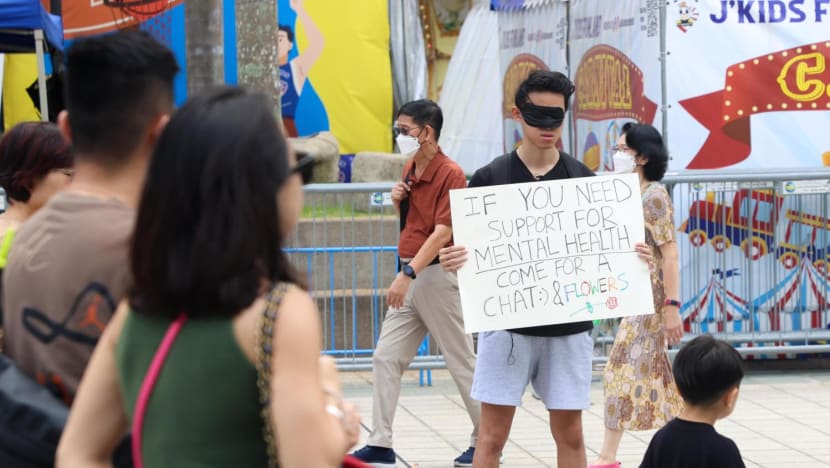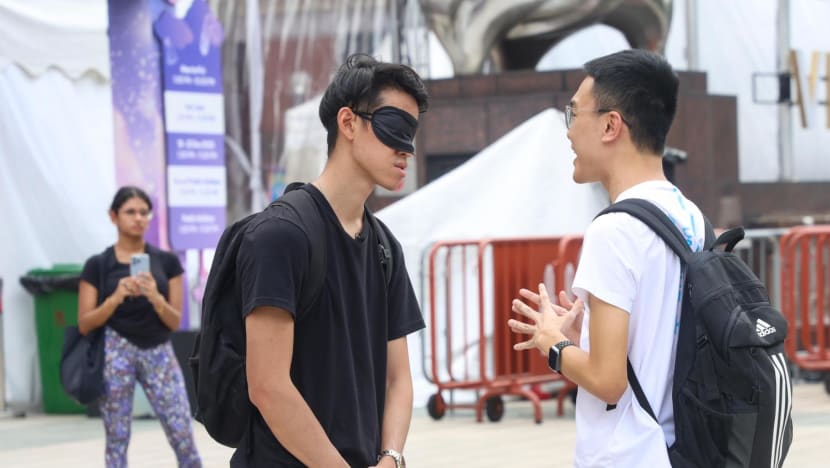The Stories Behind: The Singaporean who talks to people blindfolded, offering mental health support

Mr Kevin Wee of Radical Kindness outside Ngee Ann City on Dec 29, 2023.
SINGAPORE — I'm standing in front of Ngee Ann City in Orchard Road one afternoon, watching from afar a man in a blindfold talking to someone.
"If you need support for mental health, come have a chat," the sign he holds reads.
I do not want to intrude on the private moment, so I make sure there is enough distance between me, a journalist doing her job, and the chatting duo.
But judging by their expressions — the smiles, occasional nods and reassuring hand gestures — the five-minute conversation means a lot to both parties.
The man later takes off his blindfold, shakes the other person's hands and gives them flowers as a gesture of appreciation for sharing their personal struggles with him.
If this scene sounds familiar to you, chances are you have seen this in a TikTok or Instagram video from an account called Radical Kindness. And the man I just saw earlier? He is Mr Kevin Wee, the 29-year-old founder.
I’m meeting him for a chat myself, too, after he’s done with his stint — not about my struggles, but to find out more about him and why he chooses this unusual way of striking up conversations on delicate topics.
Occasionally, he does other things, like giving away money. He would pretend that he had lost his wallet and then rewards the person who helps him. He also does interviews with marginalised members of society.
Clearly, his approach works with viewers. It’s been only a month and a half since Radical Kindness was launched, but the TikTok account now has over 10,500 followers.
BLINDFOLD ALLOWS TALKS WITH NO JUDGEMENT
Before meeting Mr Wee, I had spoken to a few friends about his videos. They all wondered out loud if any of the videos had been staged because such a thing was common in the content creation scene.
I took this question to Mr Wee. He confidently said: “Absolutely nothing is staged. People who come to me are usually ready to open up.”
But the one thing he always did before publishing their videos was ask for their consent.
While Mr Wee’s seemingly unorthodox way of spreading kindness involves standing around in a blindfold for several hours, being able to only take in sounds with no sights, he calls it a spiritual experience.
“I would just use the time to meditate and think about my life at the time,” he told me.
Specifically, he would reflect on his past, envision his future and think about the videos he’s working on while mentally preparing himself for the next heart-to-heart talk.
These talks usually last around five to 10 minutes per person. In each session, he can engage up to 10 people.
Mr Wee said the blindfold is important because it assures people that there would be no judgement. “The blindfold also helps me so I don’t have to take in so many people’s emotions all at once,” he said.
“I also won’t be distracted by people passing by and staring in the background, and just focus on the voice in front of me.”
Asked if it was hard to get the ball rolling at the start, Mr Wee said on the contrary, those who approached him were ready to open up about their mental health and personal struggles.
Sometimes, they may even talk to him purely for the sake of getting something off their chest.
“You’d want a safe psychological space for somebody where they can trust you and not feel judged, like being in an invisible bubble,” he said.
While listening to people’s stories, Mr Wee said it is important to “ask probing questions sincerely, as well as recognise and reflect emotion. But you also have to be careful about not making it about yourself”.
On how he gained the skills to provide such support, Mr Wee pointed to two main factors: Surviving his own darkness, and practising people skills throughout his career as a speaker and the founder of a local social enterprise, Rebound with Resilience.
He founded the enterprise in 2019 with the aim to raise the mental resilience of Singaporeans, especially youths. He also works with people with disabilities by offering specialised training programmes in schools and corporate organisations.
“I would not have developed this level of compassion if not for the intensity of pain I’ve faced,” he said.
“Because I’ve faced so much darkness and battled my own demons, naturally, I developed a deep level of empathy.”

ALMOST TOOK HIS LIFE IN JULY THIS YEAR
Before starting Radical Kindness on TikTok and Instagram, Mr Wee spent the most formative years of his life battling his inner demons.
When he was studying for A-Levels, the pressure got to him, causing anxiety and depression. He woke up one night in cold sweat, feeling suicidal and grappling to control constant thoughts of death.
Mr Wee was eventually hospitalised and put on medication. Even though he started working on his recovery journey and was making good progress several months later, he slipped into a state of mania.
Mania is a condition that brings an over-the-top level of activity, energy or behaviour. “It is a state of extreme high, where you lose touch with reality and do extreme stuff,” he wrote on his Instagram.
He filmed a four-hour video of himself:
- Starting a fire in his room
- Burning his A-Levels certificate
- Drinking his own urine
- Consuming his dog’s faeces
- Dancing in his mum’s nightgown
- Cooking a frog in Bedok Reservoir
Salvation came to him in the form of caring, wise mentors who taught him interpersonal skills and shared with him the foundation of entrepreneurship, sales, leadership and personal development.
Life soon improved for him — he made it to Nanyang Technological University's Wee Kim Wee School of Communication and Information via discretionary admission.
It was also the time he knew without a sliver of doubt that he would be an entrepreneur, so he spent time building his first business as a speaker, where he could impart his life story to students in schools.
While navigating the ups and downs of life after that, he was dealt a second blow — losing his hard-earned money in a series of failed investments.
Mr Wee confessed that he was “this close” to taking his own life at 3am on July 23 this year. He had written letters and was ready to send them out.
But eventually, the thought of leaving his parents behind in perpetual grief snapped him back to his senses. He also realised how “stupid” he was for considering it.
His journey to recovery resumed with the help of two close friends.
Mr Wee was met with one last hurdle that sparked his desire to build a caring society through Radical Kindness: A heartbreak from the end of a situationship — an informal romantic or sexual relationship.
“I told myself, instead of closing my heart to love, I will love and give 10 times more than I ever had,” he said. Thus, Radical Kindness was born.
MOST MEMORABLE ENCOUNTER
Although Radical Kindness began in November, Mr Wee said that his first dive into content creation was actually three years ago, when he filmed videos for his social enterprise.
He had done the same thing — held a sign, worn a blindfold and given flowers to anyone who had something they wanted to tell him.
“The videos I edited were not as engaging. I didn’t have the expertise to make them go viral,” he admitted, showing me a nine-minute video on YouTube.
For Radical Kindness, Mr Wee then met two freelance videographers who believe in his cause: Aloysius, a 23-year-old visual artist, and Soon ZengFu, a 28-year-old software engineer.
They volunteer to film his outreach efforts on weekends, spending several hours with him each time.
“I try to compensate them a little if the hours are longer. But most of the time, they tell me they do not need anything as the process gives them a sense of fulfilment, too.
“Without them, I’m nothing,” he said.
With all the stories he had heard during his days of talking to strangers, I asked Mr Wee what his most memorable encounter had been.
But he said it was an elderly couple in their 60s, whom he met pre-Radical Kindness, a year ago during Chinese New Year.
“They were very kind and warm. So this Christmas, I visited them at their flat in Jalan Kukoh, one of the poorest neighbourhoods in Singapore, wanting to give them gifts.
“The moment I went in, the uncle said he missed me and he broke down, revealing that his wife has cancer,” he said.
Mr Wee said his heart broke the moment he heard the news.
“I cannot explain how painful it is for me to hear their story, and how painful it must be for him to see his loved one go through such suffering. Imagine their financial and emotional burdens.”
The next project he is working on now would be to raise funds for the wife’s cancer treatment.













